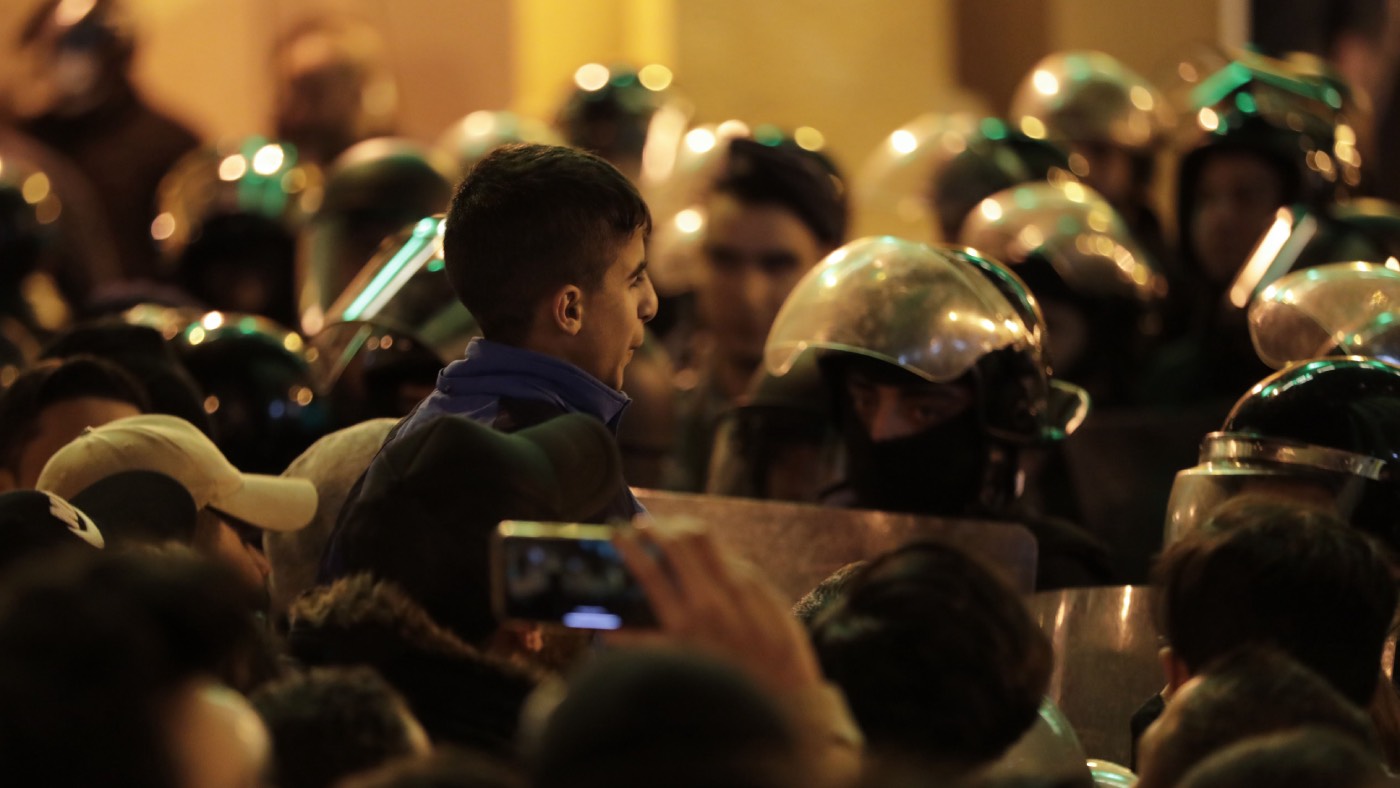Second night of violent protests in Beirut
Demonstrators angry about economic corruption as crisis grips country

A free daily email with the biggest news stories of the day – and the best features from TheWeek.com
You are now subscribed
Your newsletter sign-up was successful
Dozens of people have been hurt in a second night of clashes between riot police and anti-government demonstrators in Beirut.
Security forces in the Lebanese capital fired teargas, rubber bullets and water cannons to disperse hundreds of protesters, who pelted them with rocks and firecrackers.
According to Sky News “snatch squads” beat and detained protesters as the two sides engaged in cat-and-mouse clashes.
The Week
Escape your echo chamber. Get the facts behind the news, plus analysis from multiple perspectives.

Sign up for The Week's Free Newsletters
From our morning news briefing to a weekly Good News Newsletter, get the best of The Week delivered directly to your inbox.
From our morning news briefing to a weekly Good News Newsletter, get the best of The Week delivered directly to your inbox.
The Lebanese Civil Defence and the Red Cross said they took 46 people to hospital and treated the wounds of dozens of others at the scene of the clashes.
Chants rang out against caretaker Prime Minister Saad al-Hariri, who is widely expected to be named head of the next government during parliamentary consultations later today.
“We will not leave. They are the ones who looted the country. They are the ones who got us here. We want our rights,” Nadine Farhat, 31, a protestor, told Reuters.
Demonstrations began in October as anger rose over economic mismanagement. Protesters are angry at the regime’s failure to deal with a stagnant economy, rising prices, high unemployment, dire public services and corruption.
A free daily email with the biggest news stories of the day – and the best features from TheWeek.com
Less than a fortnight after protests began, Hariri offered his resignation, deepening the country's political crisis.
CNN says the country is “buckling under an economic crisis that has sent prices soaring, and led to mass layoffs and salary cuts”. Business have shut their doors and banks have imposed informal capital controls.
Rival political factions failed to agree on a new head of government but an administration is required to truly tackle the crisis gripping the country because foreign donors holding back financial support until there is a cabinet in place to carry out reforms.
Commentators say the crisis could be ushering in the death of the country's political system, in which power is allocated among religious groups. “This system is clearly over,” Sami Atallah, the director of the Lebanese Center for Policy Studies, told Al Jazeera.
“Economically and politically it is very clearly the end of an era. But we have yet to produce another one: we have left Lebanon 2.0 but don't have Lebanon 3.0 yet.”
–––––––––––––––––––––––––––––––For a round-up of the most important stories from around the world - and a concise, refreshing and balanced take on the week’s news agenda - try The Week magazine. Start your trial subscription today –––––––––––––––––––––––––––––––
-
 The environmental cost of GLP-1s
The environmental cost of GLP-1sThe explainer Producing the drugs is a dirty process
-
 Greenland’s capital becomes ground zero for the country’s diplomatic straits
Greenland’s capital becomes ground zero for the country’s diplomatic straitsIN THE SPOTLIGHT A flurry of new consular activity in Nuuk shows how important Greenland has become to Europeans’ anxiety about American imperialism
-
 ‘This is something that happens all too often’
‘This is something that happens all too often’Instant Opinion Opinion, comment and editorials of the day
-
 Epstein files topple law CEO, roil UK government
Epstein files topple law CEO, roil UK governmentSpeed Read Peter Mandelson, Britain’s former ambassador to the US, is caught up in the scandal
-
 Iran and US prepare to meet after skirmishes
Iran and US prepare to meet after skirmishesSpeed Read The incident comes amid heightened tensions in the Middle East
-
 Israel retrieves final hostage’s body from Gaza
Israel retrieves final hostage’s body from GazaSpeed Read The 24-year-old police officer was killed during the initial Hamas attack
-
 China’s Xi targets top general in growing purge
China’s Xi targets top general in growing purgeSpeed Read Zhang Youxia is being investigated over ‘grave violations’ of the law
-
 Panama and Canada are negotiating over a crucial copper mine
Panama and Canada are negotiating over a crucial copper mineIn the Spotlight Panama is set to make a final decision on the mine this summer
-
 Why Greenland’s natural resources are nearly impossible to mine
Why Greenland’s natural resources are nearly impossible to mineThe Explainer The country’s natural landscape makes the task extremely difficult
-
 Iran cuts internet as protests escalate
Iran cuts internet as protests escalateSpeed Reada Government buildings across the country have been set on fire
-
 US nabs ‘shadow’ tanker claimed by Russia
US nabs ‘shadow’ tanker claimed by RussiaSpeed Read The ship was one of two vessels seized by the US military